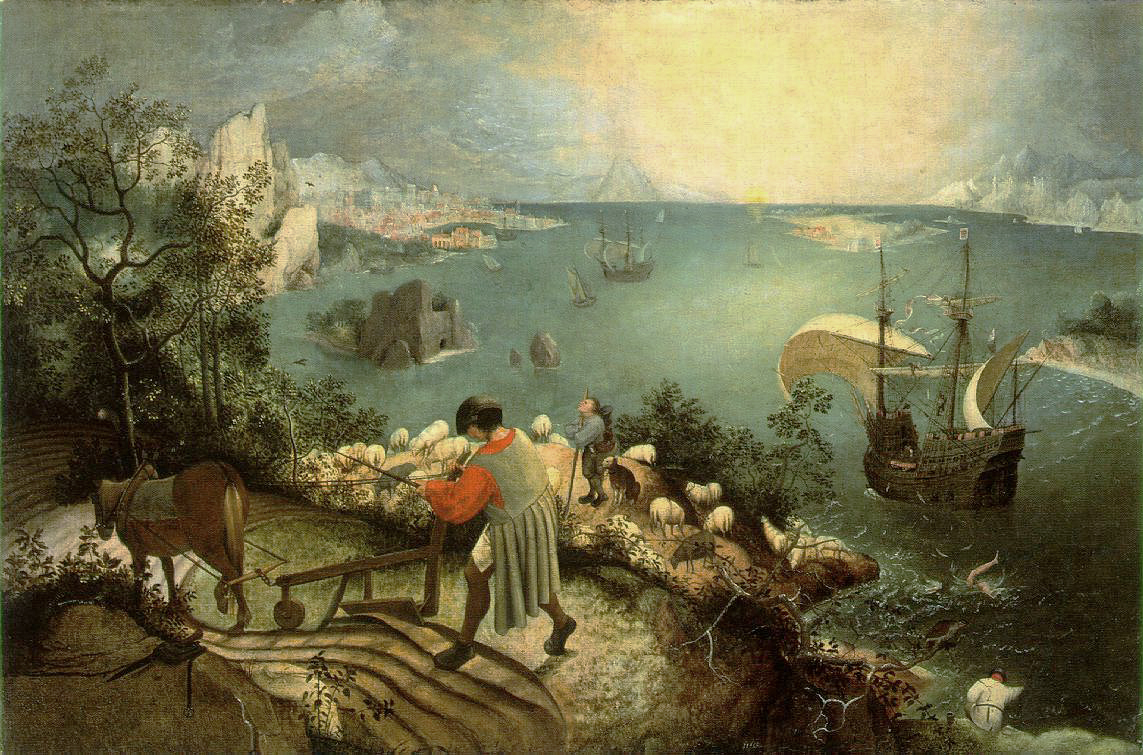Landscape With The Fall Of Icarus (poem) on:
[Wikipedia]
[Google]
[Amazon]
 "Landscape with the Fall of Icarus" is an ecphrastic poem by the 20th-century
"Landscape with the Fall of Icarus" is an ecphrastic poem by the 20th-century
 "Landscape with the Fall of Icarus" is an ecphrastic poem by the 20th-century
"Landscape with the Fall of Icarus" is an ecphrastic poem by the 20th-century American
American(s) may refer to:
* American, something of, from, or related to the United States of America, commonly known as the "United States" or "America"
** Americans, citizens and nationals of the United States of America
** American ancestry, pe ...
poet
A poet is a person who studies and creates poetry. Poets may describe themselves as such or be described as such by others. A poet may simply be the creator ( thinker, songwriter, writer, or author) who creates (composes) poems (oral or writte ...
William Carlos Williams
William Carlos Williams (September 17, 1883 – March 4, 1963) was an American poet, writer, and physician closely associated with modernism and imagism.
In addition to his writing, Williams had a long career as a physician practicing both pedia ...
that was written in response to ''Landscape with the Fall of Icarus
''Landscape with the Fall of Icarus'' is a painting in oil on canvas measuring currently displayed in the Royal Museums of Fine Arts of Belgium in Brussels. It was long thought to be by the leading painter of Dutch and Flemish Renaissance pai ...
'', traditionally attributed to Pieter Bruegel. Williams first published the poem as part of a sequence in ''The Hudson Review
''The Hudson Review'' is a quarterly journal of literature and the arts.
History
It was founded in 1947 in New York, by William Arrowsmith, Joseph Deericks Bennett, and George Frederick Morgan. The first issue was introduced in the spring of 1 ...
'' in 1960, subsequently using the sequence as the basis for his final book, ''Pictures from Brueghel and Other Poems
''Pictures from Brueghel and Other Poems'' is a 1962 book of poems by the American modernist poet/writer William Carlos Williams. It was Williams's final book, for which he posthumously won the Pulitzer Prize for Poetry in 1963. Two previously-pu ...
'', published in 1962.
The poem, as indicated by the title, touches upon the story from Ovid's ''Metamorphoses'', in which Icarus, the son of Daedalus
In Greek mythology, Daedalus (, ; Greek: Δαίδαλος; Latin: ''Daedalus''; Etruscan: ''Taitale'') was a skillful architect and craftsman, seen as a symbol of wisdom, knowledge and power. He is the father of Icarus, the uncle of Perdix, an ...
, took flight from Crete, where he and his father were trapped in exile, wearing wings made from wax and feathers. Icarus, disregarding one of his father's wishes that he not fly too close to the sun, did just that and melted his way to a feathery demise, drowning in the sea. The other warning from Daedalus was to not fly to close to the sea or the feathers of Icarus' wings would get wet and thus fail. This subject – and Bruegel's painting – are also treated by another Modernist
Modernism is both a philosophical and arts movement that arose from broad transformations in Western society during the late 19th and early 20th centuries. The movement reflected a desire for the creation of new forms of art, philosophy, an ...
poet, W. H. Auden
Wystan Hugh Auden (; 21 February 1907 – 29 September 1973) was a British-American poet. Auden's poetry was noted for its stylistic and technical achievement, its engagement with politics, morals, love, and religion, and its variety in ...
, in " Musée des Beaux Arts", first published in 1939.
References
External links
* * American poems Poetry based on Metamorphoses Works based on art {{Poem-stub